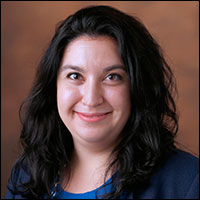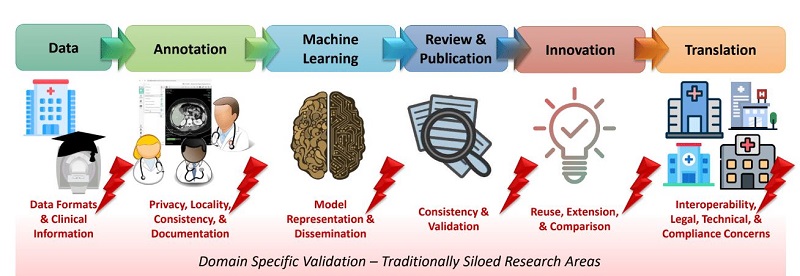Vanderbilt researchers have been awarded a National Science Foundation Convergence Accelerator 2020 Cohort Phase 1 grant to create a standardized platform that will streamline the development, testing and dissemination of technology that can improve human health.
The nine-month project, “Scalable, Traceable AI for Imaging Translation: Innovation to Implementation for Accelerated Impact (STRAIT I3),” looks specifically at public health innovations based on artificial intelligence. Co-principal investigators Bennett Landman, professor of electrical engineering, computer engineering and computer science, and Ipek Oguz, assistant professor of computer science and computer engineering, are partnering on the project with researchers from Vanderbilt University Medical Center, the Society for Imaging Informatics in Medicine, and industry partners MD.ai and Kaggle.

Among the challenges of developing AI-based health solutions is the arduous process of validating the “diamond in the rough” algorithms that undergird those solutions. The process often lacks structure and clarity due to a number of variables, and there is no standardized way of calculating the true cost of bringing a technology to market, creating significant implications for product development.
“This convergence grant brings together a cross-section of fields—researchers, data scientists, publishers, reviewers, clinical investigators and clinicians—to create a unified, comprehensive process,” Oguz explained. “We are stopping the game of musical chairs when it comes to validating technology by building a clearer and more connected chain of events. We’re reframing the big picture by pulling everyone together to plan a system that works for the entire community.”
“I wish we had something like this when the wave of AI in medicine and society was just starting,” said Landman, who is also a professor of biomedical engineering, radiology and radiological sciences, psychiatry and behavioral sciences, and biomedical informatics. “For five years we have needed a system to stop reimplementing duplicative work at every step of the process and to preserve transparency, clarity and fairness as we work on massive and urgent challenges.”
As ending the coronavirus pandemic is on the top of everyone’s list, the group will be working first with public and private COVID-19 datasets, including the National Institute for Health’s open-source resources to address COVID-19 and COVID-Net, an open-source repository of chest X-rays developed by Canadian AI researchers.

Within Vanderbilt, Oguz and Landman will bring together engineering and computer science experts, the Center for Technology Transfer and Commercialization, and researchers affiliated with the Data Science Institute and the Vanderbilt University Institute of Imaging Science. “This is a big, moving jigsaw puzzle. By bringing people together to solve and address a complex problem that is not discipline-specific, we’ll be able to raise all boats,” Landman said.
“The quantum technology and AI-driven data and model-sharing topics were chosen based on community input and identified federal research and development priorities,” said Douglas Maughan, head of the NSF Convergence Accelerator program in a release. “This is the program’s second cohort and we are excited for these teams to use convergence research and innovation-centric fundamentals to accelerate solutions that have a positive societal impact.”
In parallel with her work on this project, Oguz has created and developed a computer science course she is teaching on open-source programming for medical imaging. “This is a great semester to develop a library of remote resources as we’re all becoming very familiar with working alone, together. It’s exciting to be teaching my students a new approach and to consider how they might interact with the outcome of STRAIT I3 in the years to come,” Oguz said. The co-investigators aim to take STRAIT I3 to prototype in mid-2021 and are optimistically anticipating mass adoption of their platform within three years.

About the National Science Foundation Convergence Accelerator
Research is often driven by a compelling societal or scientific challenge; however, it may take the researcher community years to develop a solution. To deliver tangible solutions that have a nation-wide societal impact and at a faster pace, the NSF launched the Convergence Accelerator program, designed to leverage a convergence approach to transition basic research and discovery into practice.
Currently, the Convergence Accelerator is focusing on three of NSF’s Big Ideas—Harnessing the Data Revolution, the Future of Work at the Human-Technology Frontier and Quantum Leap; and two topics aligned with Advancing United States Leadership in the Industries of the Future concentrating on AI-driven data and model sharing and quantum technology. Furthermore, the Convergence Accelerator is also funding convergence research to support solutions to bolster the national response to coronavirus disease 2019 (COVID-19).
Convergence Accelerator research topics begin as an ideation process—gathering input from the community. Identified topics must meet a societal need at scale, be built upon foundational research and be suitable for a multidisciplinary, convergence research approach. Each Convergence Accelerator research topic involves a two-phase approach to ensure the selected teams and funded use-inspired convergence research are proactively and intentionally managed. Phase one beings as a nine-month planning effort. Phase two teams will continue to apply Convergence Accelerator fundamentals to develop solution prototypes and to build a sustainability model to continue impact beyond NSF support. By the end of phase two, teams are expected to provide high-impact solutions that impact societal needs at scale.